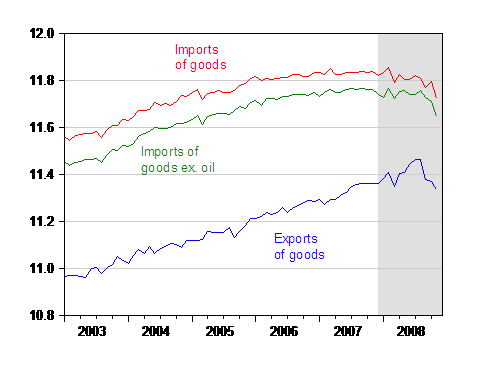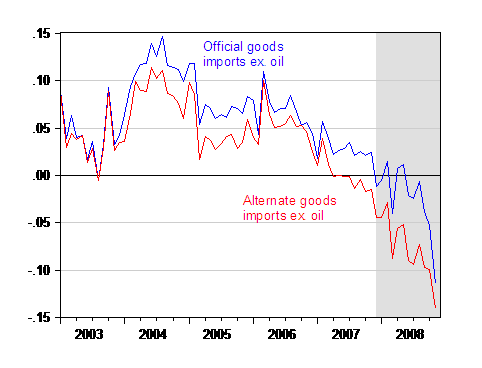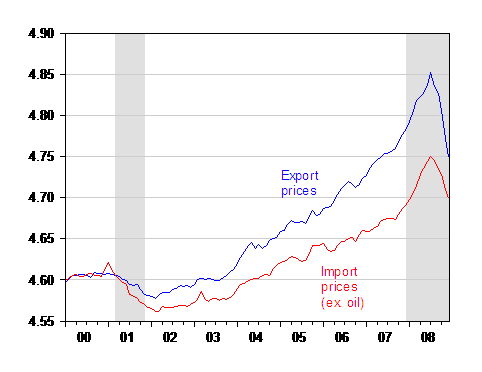The trade release has already been remarked upon, in terms of the dropoff in both exports and imports signaling a synchronized recession. [1], [2], [3], [4]
I have little to add here, except for plotting the “cliff-diving” in log real terms.

Figure 1: Log real goods exports (blue), real goods imports (red), real goods imports ex.-oil (green), seasonally adjusted. NBER-defined recessions shaded gray (assumes recession has not ended by December 2008). Source: BEA/Census trade release of 13 January 2009 and NBER.
I do want to follow up on a point I made in an earlier post. If import prices are mismeasured due to a combination of invoicing in dollar terms and the price matching model used by BLS for export/import prices (as argued by Nakamura and Steinsson (2008) [pdf]), then two points flow from this assumption. First, as discussed earlier, current GDP is higher than measured by the official statistics because imports are lower.
Second, what I didn’t mention earlier, is that with import volumes decelerating even faster than implied by the official statistics, the prospects for future US output are probably darker than we think, as import volume growth has plunged more than reflected in the official statistics (with slower import volume growth reflecting collapsing consumption).

Figure 2: Year on year growth rate in real goods imports (blue), and “alternate” growth rate assuming price mismeasurement (actual price change is twice as fast as official) (red), all calculated as 12 month log differences. Source: BEA/Census trade release of 13 January 2009, BLS import/export price index release of 14 January 2009, NBER, and author’s calculations.
Commenting on the trade flows, Ian Shephardson of High Frequency Economics remarked to WSJ RealTime Economics: “As far as we can tell, trade flows have been crushed by the credit crunch, which has reduced demand for traded goods and services and made it more difficult for exporters and imports to obtain trade finance. The result is that the data have become impossible to forecast. We now reckon real fourth quarter exports fell 27%, with imports down 16%.” This comment could be taken as good news or bad news. It’s bad news to the extent that the financial crisis is affecting aggregate demand via yet another channel (see [5], [6]). It’s good news if one believes that problems in the credit markets are steadily disappearing.
By the way, the dropoff in trade prices is also quite remarkable. Here’s export and import (ex oil) prices, from today’s release.

Figure 3: Goods export prices (blue), and goods import prices, ex.-oil (red), 2000=log(100). Source: BLS import/export price index release of 14 January 2009, NBER, and author’s calculations.
The non-oil terms of trade are therefore deteriorating, given the faster drop in export prices (recall the plotted series are in logs). The total terms of trade are, in contrast, improving and are back to 2007M01 levels.
Technorati Tags: imports, pass through, import pries,
recession, and exports.
Menzie, I have heard some talk (here and other places) that a lack of trade financing is a major factor in declining imports and exports. Assuming services are easier/less costly to transport (i.e. overseas call centers and the like), one might expect service trade to have held up better than goods trade. I’m just wondering if this has been the case, or if anyone has looked at that.
Menzie wrote:
…slower import volume growth reflecting collapsing consumption…
Menzie,
Thanks for this comment. Too many people look at the trade balance and do not understand that a negative trade balance actually signals a weakening of the economy (production) rather than a strong economy. When the currency is manipulated to gain a trade advantage it actually works against trade and almost alway against the country attempting to manipulate trade.
Nice graphs, as usual.
Regarding figure 3, prices are back to levels of early ’07, roughly. So the runnup in commodities earlier in ’08 was just a blip, and is being worked out of prices as we speak.
This is the catalyst for the next major crisis that will happen this year, in my opinion. The collapse of global trade and the currency issues that result are going to cause some major political instability.
Kavan: Good observation. I haven’t seen anything on call center business, except anecdotal evidence related to Indian outsourcing. But the income elasticity of call center services is likely different from that for real commodities, so it would be hard to tease out the impact due to credit crunch on real-goods trade financing.
Buzzcut: Even excluding commodities, export prices are declining. See data through September in Figure 3 in this post.
So a substantial portion of this is good news, correct?
Menzie, can you do an updated graph of the trade deficit as a percentage of GDP, both with and without oil? I think the last one you did was on Nov. 15.
What’s the y variable?
AccountedFpr: Figure 1, natural log of millions of USD; Figure 2, percent in decimal form; Figure 3, log of index (2000=100).
The Keynesians at the Levy Economics Institute of Bard College have an interesting take on the direction of the trade balance. With no stimulus package, U.S. GDP will collapse and trade will balance. The higher the stimulus package, the higher the trade balance. They are basically saying that a stimulus plan cannot succeed unless it addresses the trade deficit at the same time. There are links to it in my blog entry today.
Howard Richman
http://www.tradeandtaxes.blogspot.com
Howard,
I would agree. I have put up a number of posts on that dilemma. Without addressing the trade deficit and worsening recession simultaneously, we are in deep trouble.
Paradoxically, so is Asia.
Add a another agreement with Howard.
“Trade Deficit” does not appear in the index of Thomas Sowell very readable summary of mainstream economic thinking (Basic Economics, 20004). Sowell touches on many aspects of the trade deficit, always to discount or minimize its effect, but he does not want to draw his readers attention to what he has to say on the subject.
A blind spot shared with many economists.
The first step to recovery is to discus fully and in detail the growth of the U.S. trade deficit, its cause and its consequences. After this development is understood, economists will be more willing to listen to a call to action.
The first academic international trade economists I talked with about the trade deficit assured me that lack of savings in the U.S. was the sole cause of the trade deficit and the only way to reduce the trade deficit. Appareently, market forces cease control of market decisions when it comes to internatioanl trade.
Howard, Stormy, and Ray,
You are missing the bigger picture of Menzie’s post. International trade is slowing. One man’s export is another man’s import, but if trade is slowing no one is gaining and everyone is losing. The question should not be the trade deficit but why is overall trade declining.
I see this as two reasons primarily.
First, world wide demand is falling as the malinvestments of the inflationary boom begin to become manifest and the destruction of capital is realized: homes sitting idle, factory inventories growing, etc.
But the second is less recognized by economists. Exchange rate volatility has exploded. The ratio of the dollar to the euro the pound and the yen have been huge. These great shifts in exchange rates cannot be planned by importers/exporters and so their only hedge is to not trade and hope that the fluctuations settle. The same can be seen in insurance and financing of international shipments.
Many economists get the cart before the hourse by blaming exchange rate fluctuations on trade but in truth exchange rate fluctuations are more a function of monetary authorities mishandling currency supplies than anything else.
Our crisis is almost totally government mishandling of the situation both monetary and fiscal, yet the government continues to impose itself on any recovery by claiming that only the government can solve the problem. Actually only government can create such a mess.